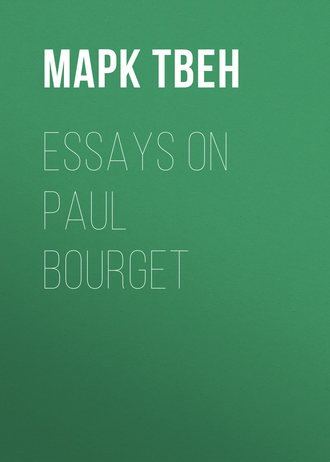
Марк Твен
Essays on Paul Bourget
It relates to manners, customs, and morals – three things concerning which we can never have exhaustive and determinate statistics, and so the verdicts delivered upon them must always lack conclusiveness and be subject to revision; but you have stated the truth, possibly, as nearly as any one could do it, in the circumstances. But why did you choose a detail of my question which could be answered only with vague hearsay evidence, and go right by one which could have been answered with deadly facts? – facts in everybody’s reach, facts which none can dispute. I asked what France could teach us about government. I laid myself pretty wide open, there; and I thought I was handsomely generous, too, when I did it. France can teach us how to levy village and city taxes which distribute the burden with a nearer approach to perfect fairness than is the case in any other land; and she can teach us the wisest and surest system of collecting them that exists. She can teach us how to elect a President in a sane way; and also how to do it without throwing the country into earthquakes and convulsions that cripple and embarrass business, stir up party hatred in the hearts of men, and make peaceful people wish the term extended to thirty years. France can teach us – but enough of that part of the question. And what else can France teach us? She can teach us all the fine arts – and does. She throws open her hospitable art academies, and says to us, “Come” – and we come, troops and troops of our young and gifted; and she sets over us the ablest masters in the world and bearing the greatest names; and she, teaches us all that we are capable of learning, and persuades us and encourages us with prizes and honors, much as if we were somehow children of her own; and when this noble education is finished and we are ready to carry it home and spread its gracious ministries abroad over our nation, and we come with homage and gratitude and ask France for the bill – there is nothing to pay. And in return for this imperial generosity, what does America do? She charges a duty on French works of art!
I wish I had your end of this dispute; I should have something worth talking about. If you would only furnish me something to argue, something to refute – but you persistently won’t. You leave good chances unutilized and spend your strength in proving and establishing unimportant things. For instance, you have proven and established these eight facts here following – a good score as to number, but not worth while:
Mark Twain is —
1. “Insulting.”
2. (Sarcastically speaking) “This refined humorist.”
3. Prefers the manure-pile to the violets.
4. Has uttered “an ill-natured sneer.”
5. Is “nasty.”
6. Needs a “lesson in politeness and good manners.”
7. Has published a “nasty article.”
8. Has made remarks “unworthy of a gentleman.” – [“It is more funny than his” (Mark Twain’s) “anecdote, and would have been less insulting.”]
A quoted remark of mine “is a gross insult to a nation friendly to America.”
“He has read La Terre, this refined humorist.”
“When Mark Twain visits a garden… he goes in the far-away corner where the soil is prepared.”
“Mark Twain’s ill-natured sneer cannot so much as stain them” (the Frenchwomen).
“When he” (Mark Twain) “takes his revenge he is unkind, unfair, bitter, nasty.”
“But not even your nasty article on my country, Mark,” etc.
“Mark might certainly have derived from it” (M. Bourget’s book) “a lesson in politeness and good manners.”
A quoted remark of mine is “unworthy of a gentleman.” —
These are all true, but really they are not valuable; no one cares much for such finds. In our American magazines we recognize this and suppress them. We avoid naming them. American writers never allow themselves to name them. It would look as if they were in a temper, and we hold that exhibitions of temper in public are not good form except in the very young and inexperienced. And even if we had the disposition to name them, in order to fill up a gap when we were short of ideas and arguments, our magazines would not allow us to do it, because they think that such words sully their pages. This present magazine is particularly strenuous about it. Its note to me announcing the forwarding of your proof-sheets to France closed thus – for your protection:
“It is needless to ask you to avoid anything that he might consider as personal.”
It was well enough, as a measure of precaution, but really it was not needed. You can trust me implicitly, M. Bourget; I shall never call you any names in print which I should be ashamed to call you with your unoffending and dearest ones present.
Indeed, we are reserved, and particular in America to a degree which you would consider exaggerated. For instance, we should not write notes like that one of yours to a lady for a small fault – or a large one. – [When M. Paul Bourget indulges in a little chaffing at the expense of the Americans, “who can always get away with a few years’ trying to find out who their grandfathers were,”] he merely makes an allusion to an American foible; but, forsooth, what a kind man, what a humorist Mark Twain is when he retorts by calling France a nation of bastards! How the Americans of culture and refinement will admire him for thus speaking in their name!
Snobbery… I could give Mark Twain an example of the American specimen. It is a piquant story. I never published it because I feared my readers might think that I was giving them a typical illustration of American character instead of a rare exception.
I was once booked by my manager to give a causerie in the drawing-room of a New York millionaire. I accepted with reluctance. I do not like private engagements. At five o’clock on the day the causerie was to be given, the lady sent to my manager to say that she would expect me to arrive at nine o’clock and to speak for about an hour. Then she wrote a postscript. Many women are unfortunate there. Their minds are full of after-thoughts, and the most important part of their letters is generally to be found after their signature. This lady’s P. S. ran thus: “I suppose he will not expect to be entertained after the lecture.”
I fairly shouted, as Mark Twain would say, and then, indulging myself in a bit of snobbishness, I was back at her as quick as a flash:
“Dear Madam: As a literary man of some reputation, I have many times had the pleasure of being entertained by the members of the old aristocracy of France. I have also many times had the pleasure of being entertained by the members of the old aristocracy of England. If it may interest you, I can even tell you that I have several times had the honor of being entertained by royalty; but my ambition has never been so wild as to expect that one day I might be entertained by the aristocracy of New York. No, I do not expect to be entertained by you, nor do I want you to expect me to entertain you and your friends to-night, for I decline to keep the engagement.”
Now, I could fill a book on America with reminiscences of this sort, adding a few chapters on bosses and boodlers, on New York ‘chronique scandaleuse’, on the tenement houses of the large cities, on the gambling-hells of Denver, and the dens of San Francisco, and what not! [But not even your nasty article on my country, Mark, will make me do it.] – We should not think it kind. No matter how much we might have associated with kings and nobilities, we should not think it right to crush her with it and make her ashamed of her lowlier walk in life; for we have a saying, “Who humiliates my mother includes his own.”
Do I seriously imagine you to be the author of that strange letter, M. Bourget? Indeed I do not. I believe it to have been surreptitiously inserted by your amanuensis when your back was turned. I think he did it with a good motive, expecting it to add force and piquancy to your article, but it does not reflect your nature, and I know it will grieve you when you see it. I also think he interlarded many other things which you will disapprove of when you see them. I am certain that all the harsh names discharged at me come from him, not you. No doubt you could have proved me entitled to them with as little trouble as it has cost him to do it, but it would have been your disposition to hunt game of a higher quality.
Why, I even doubt if it is you who furnish me all that excellent information about Balzac and those others. – [“Now the style of M. Bourget and many other French writers is apparently a closed letter to Mark Twain; but let us leave that alone. Has he read Erckmann-Chatrian, Victor Hugo, Lamartine, Edmond About, Cherbuliez, Renan? Has he read Gustave Droz’s ‘Monsieur, Madame, et Bebe’, and those books which leave for a long time a perfume about you? Has he read the novels of Alexandre Dumas, Eugene Sue, George Sand, and Balzac? Has he read Victor Hugo’s ‘Les Miserables’ and ‘Notre Dame de Paris’? Has he read or heard the plays of Sandeau, Augier, Dumas, and Sardou, the works of those Titans of modern literature, whose names will be household words all over the world for hundreds of years to come? He has read La Terre – this kind-hearted, refined humorist! When Mark Twain visits a garden does he smell the violets, the roses, the jasmine, or the honeysuckle? No, he goes in the far-away corner where the soil is prepared. Hear what he says: ‘I wish M. Paul Bourget had read more of our novels before he came. It is the only way to thoroughly understand a people. When I found I was coming to Paris I read La Terre.’”] – All this in simple justice to you – and to me; for, to gravely accept those interlardings as yours would be to wrong your head and heart, and at the same time convict myself of being equipped with a vacancy where my penetration ought to be lodged.
And now finally I must uncover the secret pain, the wee sore from which the Reply grew – the anecdote which closed my recent article – and consider how it is that this pimple has spread to these cancerous dimensions. If any but you had dictated the Reply, M. Bourget, I would know that that anecdote was twisted around and its intention magnified some hundreds of times, in order that it might be used as a pretext to creep in the back way. But I accuse you of nothing – nothing but error. When you say that I “retort by calling France a nation of bastards,” it is an error. And not a small one, but a large one. I made no such remark, nor anything resembling it. Moreover, the magazine would not have allowed me to use so gross a word as that.
You told an anecdote. A funny one – I admit that. It hit a foible of our American aristocracy, and it stung me – I admit that; it stung me sharply. It was like this: You found some ancient portraits of French kings in the gallery of one of our aristocracy, and you said:
“He has the Grand Monarch, but where is the portrait of his grandfather?” That is, the American aristocrat’s grandfather.
Now that hits only a few of us, I grant – just the upper crust only – but it hits exceedingly hard.





